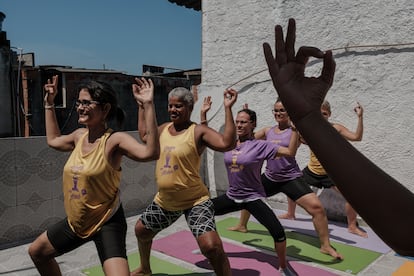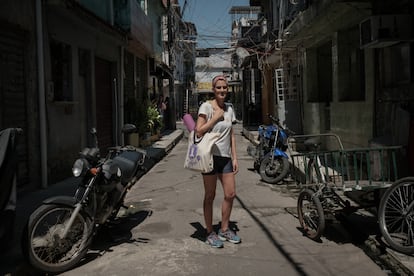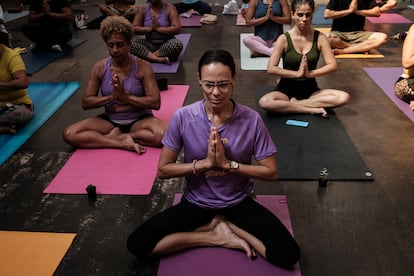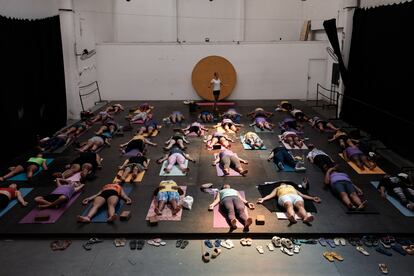Breathing under gunfire: The yoga revolution in Rio de Janeiro’s favelas
Countless neighbors have found in the classes offered at the Yoga na Maré Institute a way to cope with the stress caused by continuous police operations

It is a quiet dawn in Complexo da Maré, a group of favela slums on the northern outskirts of Rio de Janeiro. The previous day, a police operation brought chaos — and a storm of gunfire — to the area, but now the usual atmosphere of tense calm is back. Little by little, an old industrial warehouse that has been used as a cultural center for years fills up with colored mats. In a few minutes the hustle and bustle of the street will give way to a little over an hour of deep relaxation: it is the yoga class of the Yoga na Maré Institute, a social project that for eight years has been revolutionizing daily life in these favelas, one of the most violent areas of the city. This practice, previously seen as exotic, elitist and out of reach, is now embraced by countless neighbors — mostly women — who enthusiastically strive to perfect their asanas.
It all started with Ana Olivia Cardoso, a young Portuguese woman living in Rio who always dreamed of using yoga as a transformative element. The concept was immediately welcomed, thanks to the crucial help of word of mouth. Now, between the virtual and the traditional classes, she has almost 200 students. Those who attend in Maré share a WhatsApp group where they are notified early in the morning if there is a shooting, which forces them to cancel or take extreme precautions. Once they are together, they create a parallel reality. Neither the heat nor the occasional racket of a motorbike can disturb them. Peace reigns.

After class, surrounded by her chatty students, Cardoso explains: “The day after a [police] operation, the students are super stressed. We have to improvise frequently, work more on the breathing... It’s not magic, but it helps a lot. The violence is horrible, dramatic, but since there are things we can’t change, at least we can try to change the way we deal with those problems.” One time the police burst into the class with their guns in their hands, right at the end, when the students were lying down with their eyes closed, in a moment of maximum relaxation. “I thought about getting them out of there. Instead of chanting the final mantra I asked them to move slowly towards the wall with their eyes closed. When they were safe, I told them about the operation. At least it wasn’t so traumatic,” she recalls.
The daily violence of these favelas in a state of permanent war is the cause of a mental health epidemic that hides, invisible, behind the dark headlines about death and gunshots. Cardoso says that 80% of her students have been diagnosed with post-traumatic stress, anxiety and panic syndrome. Many of them have been taking medication for years, and thanks to the classes they are finally gaining the strength to abandon the pills. Cheerful Creuza dos Santos is one of the pioneering yogis: “The movement of the body is beautiful, that relaxation, we travel without leaving the place. And to think that at my age, 66, I feel young. I feel more renewed every day. We have really improved our quality of life,” she says proudly as she showers her teacher with praise. She even has an affectionate nickname for her: “beija flor” (hummingbird).

Cardoso adds that the positive effect of the classes reaches all the way to their families. Many of the students are housewives or heads of families in difficult environments, who, thanks to yoga, have been able to put a stop to insomnia or irritability. “In the end everything balances the family core. Not just her as an individual. Even if the son or the husband don’t come, they are being touched by it,” says the teacher.
Although the classes are rigorous with the teaching of yoga and all that it implies (body awareness, philosophy, mantras and so on), the crucial element here is inclusion and a sense of community. So much so that most of the students arrive earlier and stay a while later, because the moment of hugging, of asking a friend how life is going, is an essential part of that moment of self-care. Nobody here grabs their backpack and runs off. One Friday a month they share a breakfast, and they also have vegan food workshops, mountain retreats and trips to the touristic parts of Rio, where they hold massive open-air classes.
Yoga took root very quickly in Complexo da Maré. One of the first students was also one of the most illustrious neighbors: activist and councilor Marielle Franco, who was brutally murdered in 2018. With the growth in the number of students, the social project went one step further and four years ago inaugurated the Nubes center of wellbeing and health, a small house in an alley where a more individualized kind of treatment can be found, from massages and acupuncture to art therapy. Then another leap in scale occurred a few weeks ago when 16 students officially graduated as yoga teachers. In this way, one of the initial goals was fulfilled: that the practice causes a shock wave and becomes an alternative for the future for the residents of the neighborhood.
Josierica Mendes, one of the new teachers, admits that although she was convinced right from the beginning, she had to face a lot of prejudice from the evangelical churches, which number in the dozens around these parts. “The pastor told me that I was going to worship other gods: ‘the one with the elephant head,’ ‘the one with many arms.’ I went through a crisis, but it was a time of learning. In the end I left the church and focused on the yoga,” she concludes.
Mendes worked hard and after 15 months became one of the new teachers. It was not an easy feat: the Covid-19 pandemic got in the way and delayed everything. To waste as little time as possible, Cardoso taught part of the classes online, with the students doing their best in tiny houses with unstable internet connections and surrounded by noise. Now Mendes teaches in a gym and in a health center, and she is training to teach yoga for children, to help alleviate the anxiety of the younger residents of Complexo da Maré. “I’m already a seed,” she says, grinning from ear to ear.

After this first group of teachers, the Yoga na Maré Institute continues to dream big, although the challenges they face are as big as their ambitions. Both the training courses and the day-to-day classes are free; so far, everything is financed with individual donations, and the lack of resources is the main obstacle that prevents them from having their own permanent headquarters. There is even a project to open an Ayurveda laboratory and a group of psychologists.
Even though the pandemic brought a boost in followers on their YouTube channel, as well as more donors, the yogis still dream of some patron that helps them make a leap in scale — but always respecting the local way of doing things. Teacher and students work together, helping each other; it is a horizontal relationship that Cardoso wants to preserve. “I want this more and more, to highlight the power that there is here. I didn’t come from outside to save anyone. Maré has a lot of power, all this was already here, I only woke it up through yoga,” she says with certainty.
Sign up for our weekly newsletter to get more English-language news coverage from EL PAÍS USA Edition
Tu suscripción se está usando en otro dispositivo
¿Quieres añadir otro usuario a tu suscripción?
Si continúas leyendo en este dispositivo, no se podrá leer en el otro.
FlechaTu suscripción se está usando en otro dispositivo y solo puedes acceder a EL PAÍS desde un dispositivo a la vez.
Si quieres compartir tu cuenta, cambia tu suscripción a la modalidad Premium, así podrás añadir otro usuario. Cada uno accederá con su propia cuenta de email, lo que os permitirá personalizar vuestra experiencia en EL PAÍS.
¿Tienes una suscripción de empresa? Accede aquí para contratar más cuentas.
En el caso de no saber quién está usando tu cuenta, te recomendamos cambiar tu contraseña aquí.
Si decides continuar compartiendo tu cuenta, este mensaje se mostrará en tu dispositivo y en el de la otra persona que está usando tu cuenta de forma indefinida, afectando a tu experiencia de lectura. Puedes consultar aquí los términos y condiciones de la suscripción digital.








































